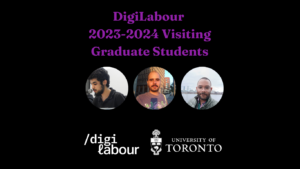In 2023-2024, DigiLabour hosted three visiting graduate students at the Faculty of Information, University of Toronto. All three came from Brazil and spent months in Canada with scholarships from Brazilian and Canadian agencies.
Get to know a little about each of them and their activities they conducted in Toronto with us:
Andre Campos Rocha
PhD Candidate, Social Sciences, Catholic University of Minas Gerais, Brazil
Visiting Period at the University of Toronto: September, 2023 – July, 2024
Supervisor: Rafael Grohmann
Scholarship from: CAPES, Brazil.
What did this period at the University of Toronto mean to you?
“I research labor in the games industry through political economy, labor processes, and migration lens. The period at the University of Toronto was an extremely enriching experience, both personally and academically. I was very well hosted by all the students, staff, and Faculty. The university has a fantastic structure, with great libraries, gyms, very well-equipped classrooms, and spaces reserved for doctoral students. In addition to taking a course with Professor Rafael Grohmann, Political Economy and Cultural Studies of Information, and being part of two study groups, Digital Labor and Data Subjectivities, and Worker’s Resistance in Digital Labor Studies, I participated in many of the various academic events that constantly take place there, presenting my work at two of them. This has significantly expanded my contacts and research networks – many of which involving researchers around the world – establishing academic dialogues with both the brilliant students and Professors at UofT, who are leaders in their respective fields of study. All of these things were fundamental in guiding my research and writing my thesis, and will certainly contribute to the development of future articles and publications. Studying at UofT was undoubtedly a turning point in my academic and professional career, an experience that I will carry with me for the rest of my life”.
Guilherme Guilherme
PhD Candidate, Social Sciences, Federal University of Sao Paulo, Brazil
Visiting Period at the University of Toronto: September, 2023 – August, 2024
Supervisor: Alessandro Delfanti
Scholarship from: FAPESP, Brazil
What did this period at the University of Toronto mean to you?
“The research period at the University of Toronto was extremely enriching. The professors at the University have a relevant output for my research topic and have always been open to contributing and suggesting discussions, topics and bibliography. Participating in the Digital Labor and Data Subjectivities working group, where students and professors collectively debate important texts in the field as well as their own ongoing projects and texts, was one of the highlights, providing good direction for the future of my own research. Many other activities, discussions, and workshops happen often, such as the Cross-Talks at the Faculty of Information and the Monday Night Seminars at the Centre for Culture and Technology. Professor Rafael Grohmann frequently organizes book launches and debates where researchers present their research and have the opportunity to discuss it. There are also very interesting conferences, such as the Log Out!, which gave PhD students the opportunity to present the concepts they have been working on, along with debate panels of established researchers. This period at the University of Toronto certainly contributed greatly to the direction of my research, helping me to better think through the questions I am trying to answer and to add new questions and topics, as well as providing the opportunity to interact and dialogue with leading researchers in the field of labor, technology, platforms, and resistance”.
Alceu Fernandes da Costa Neto
Master Student, Sociology, University of Brasilia, Brazil
Visiting Period at the University of Toronto: February-June, 2024.
Supervisor: Rafael Grohmann
Scholarship from: Emerging Leaders in the Americas Program (ELAP), Canada
What did this period at the University of Toronto mean to you?
“My research focuses on the relationships between labor in the current state of capitalism and forms of exclusion and inequality. As a visiting graduate student, I was able to take full advantage of all the opportunities and resources offered by the University. I was affiliated with the Faculty of Information (iSchool), strategically located in connection with the Robarts Library. While in the corridors and study rooms of the iSchool, I met fellow researchers from around the world, with whom I shared various ideas and research. The Robarts Library provided me with privileged access to books and databases with numerous articles published in the most relevant academic journals, greatly expanding the bibliographic capacity of my work. During the semester, I participated in seminars and events on various topics, such as technology, law, race and inequality. I fondly recall the meetings organized by the Schwartz Reisman Innovation and Black Research Network. In addition to attending some classes and debates, I met professors from various departments, such as Sociology, Business, and Political Science. During this period, I made progress on writing my master’s thesis and also started new research, which I was able to present at the Canadian Association for Work and Labour Studies (CAWLS) held at the Université du Québec à Montréal in Montreal (UQAM). Undoubtedly, the highlight and most important aspect of this process was the supervision of Professor Rafael Grohmann, who generously guided and facilitated all the paths I traversed. Beyond all the academic development, Toronto presented me an indescribable landscape marked by organization, diversity, and an incomparable urban dynamic. I will forever cherish the friendships, moments of camaraderie, places I visited, and experiences that made this journey much more than ‘just’ work”.
Starting in August 2024, Andre Campos Rocha, Guilherme Guilherme and Alceu Fernandes da Costa Neto will become affiliated researchers of DigiLabour. We will also soon announce the 2024-2025 visiting graduate students cohort.
